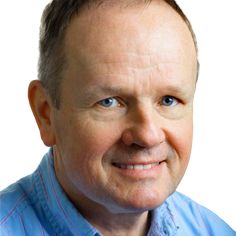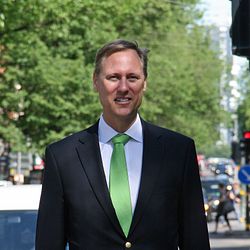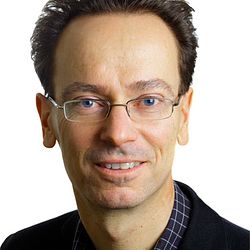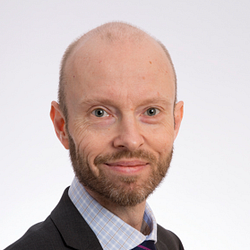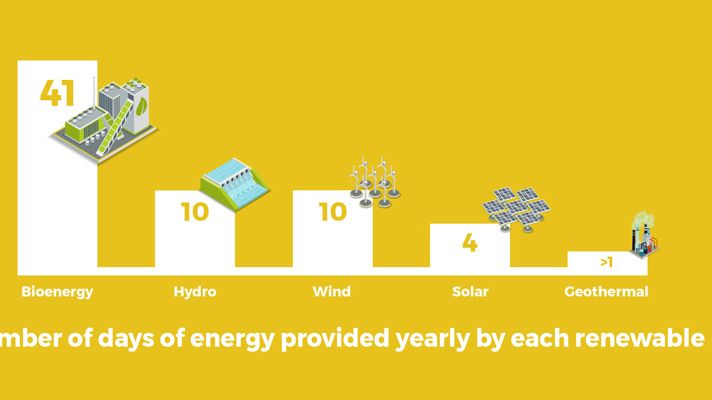
Pressmeddelande -
From November 21st, Europe runs on bioenergy alone
Renewables are expected to provide Europe with 66 days’ worth of renewable energy in 2017, with as much as 41 days provided by bioenergy alone. Bioenergy has reached an all-time high in Europe – which is great news in light of the alarming announcements made by scientists on climate change at COP23. Because of this, a new information campaign, the ‘Bioenergy Day’, aims at raising awareness on bioenergy’s pivotal role in the renewable energy transition.
While most Europeans support the transition towards renewables, they often lack a clear understanding of where the EU stands in this process. Take the example of bioenergy: biomass is on its way to surpassing European coal production to become the first indigenous European energy source – but this remains difficult to gauge. Bioenergy is also Europe’s first source of renewable energy, yet this is far from common knowledge.
To help better understand bioenergy’s role in renewables in a meaningful and engaging way, the European Biomass Association (AEBIOM) has launched a new campaign that will be relayed in over 20 European countries thanks to the support of 30 national associations and a dozen international trade federations. The “Bioenergy Day” campaign makes use of original analogies to explain where the EU stands in the development of renewables, and in particular, bioenergy. Spreading the projection for Europe’s energy demand in 2017 across the calendar year makes it clear: Europe is still relying heavily on fossil fuels and nuclear for the first 299 days. Renewables follow with 66 days of clean energy, with bioenergy accounting for 41 days, starting on November 21st until the end of the year. This is the symbolic date that AEBIOM has chosen to celebrate the ‘Bioenergy Day,’ and the positive news is that since the introduction of the Renewable Energy Directive in 2008, this date has never been so early. This encouraging outcome will be warmly celebrated during the European Bioenergy Future Conference, taking place in Brussels on November 21st and 22nd 2017.
“By creating an occasion to celebrate the European Bioenergy Day, we want to recall everyone’s attention on an often-neglected leader of the renewable energy transition,” says Didzis Palejs, Managing Director of the Latvian Biomass Association (LATbio) and President of AEBIOM. “Bioenergy represents a great diversity of mobilised materials and technologies that deliver plenty of overlooked social and environmental benefits. There’s room to deliver more, and to do so in a sustainable way. We should all look forward to having the Bioenergy Day earlier every year, signaling a much-needed relief from fossil fuel consumption”.

According to AEBIOM, the bioenergy sector should aspire to move the date to October by 2030, hitting a RES target of 35% with bioenergy continuing to play a central role. Being currently produced from a great diversity of raw materials such as wood pellets and chips, straw, vegetable oil, manure, agro-industrial and organic waste, bioenergy has plenty of ways to reach that target – including unconventional materials and innovative technologies. For this reason, the European Bioenergy Day website features 41 inspirational bioenergy stories, a quiz to test your knowledge on the EU energy transition and creative comparisons – so that both experts and novices can have a fresh perspective on bioenergy.
Note for Editors: The “European Bioenergy Day” campaign is powered by the European Biomass Association (AEBIOM), its network the European Pellet Council (EPC) and the International Biomass Torrefaction Council (IBTC), and relayed across Europe by partners all convinced that bioenergy is more than a renewable energy source, but a reliable path that Europe should take to achieve its energy transition in the shortest span of time.
Press Contacts:
Jean-Baptiste Boucher, Communications Director Aebiom
boucher@aebiom.org, Mobile: +32 472 79 11 60
Available translations: French, German, Italian, Spanish, Swedish, Finnish, Greek, Bulgarian, Romanian, Czech
Relaterade länkar
Ämnen
Kategorier
Svebio - Svenska Bioenergiföreningen - är branschorganisation för företag som arbetar med att framställa, hantera och använda olika typer av biobränslen. Svebios ändamål är att öka användningen av bioenergi på ett miljömässigt och ekonomiskt optimalt sätt. Svebio grundades 1980 och har cirka 300 företag som medlemmar. www.svebio.se


